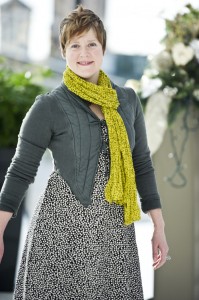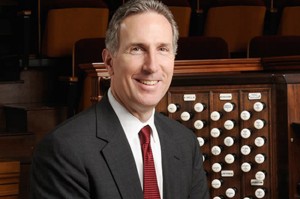The NOVA Chamber Music Series under Jason Hardink’s direction has been a major proponent of the music of 20th century masters. Among them is the Frenchman Olivier Messiaen, a composer Hardink champions and whose music he has a close affinity to.
So it’s not too surprising that the featured work on NOVA’s first concert of 2015 is going to be something by Messiaen – his song cycle Harawi, for soprano and piano. Performing it will be returning guest artist Tony Arnold, with Hardink at the piano.
Messiaen wrote Harawi at the end of World War II, in 1945. The 12-movement song cycle takes its name from an Andean love song genre which frequently ends with the deaths of the lovers. The parallel to the Tristan and Isolde legend is quite obvious, and Messiaen was certainly drawn to the story of the two doomed lovers. In fact, the subtitle of the work, Chant d’amour et de mort (Song of Love and Death) certainly plays up the composer’s fascination with what lies at the core of the Tristan and Isolde myth, according to Hardink. “Messiaen was obsessed with the Tristan myth,” he told Reichel Recommends.
And although Messiaen’s later works are spiritual and very much focused on religious themes, his earlier works, those written in the 1930s and ‘40s, are definitely secular in nature, although with occasional references to Roman Catholic liturgy. “The love between the two people in Harawi is not referenced to theology,” Hardink said. “It’s not divine love.”
Harawi, along with the other works from around this time (including the massive Tourangalîla Symphony and the Cinq Rechants, both completed in 1948) are more direct and down to earth than his later pieces. “They’re earthy and sensual.” And despite the fact Harawi deals with death and was written in the aftermath of Seclond World War, it’s not a dark piece, Hardink said. “Even though he lived through an apocalyptic war, Messiaen always manages to see the positive side of things in his music.”
Arnold has performed Harawi several times and has also recorded it with her longtime musical partner, pianist Jacob Greenberg. But for Hardink this will be his first performance. “I’m a little intimidated because Tony has done it so many times,” Hardink said, “but I’m also excited to do it.”
The nearly hour-long song cycle will take up the entire second half of the program. For the first half Hardink has programmed Gregorian Chant, sung by the Choristers of the Cathedral of the Madeleine, and J.S. Bach’s Passacaglia and Fugue in C minor, BWV 582, played by principal Mormon Tabernacle Choir organist Richard Elliott.
“The first half of the program is so strong,” Hardink said, noting that there should be a wonderful balance between the two halves, especially since Messiaen was indebted to chant, church modes and the rhythmic flexibility of early liturgical music.
Hardink is looking forward to having the young choristers on a NOVA concert. He said that he’s always been impressed with the dedication these young singers have to performing early church music. “It’s pretty amazing to have such well trained young singers in our community who sing chant on a weekly basis. It’s really quite a special thing.”
And having Elliott on the program is also a treat, Hardink said. “Richard is a world class organist.” This is Elliott’s first time performing on a NOVA concert, but Hardink hopes to invite him back. “Libby Gardner [Concert Hall, where the concert will take place] is built for choir and organ,” Hardink said. “The acoustics in the hall give it a cathedral sound.”
- CONCERT DETAILS
- What: NOVA Chamber Music Series
- Venue: Libby Gardner Concert Hall, University of Utah
- Time and Date: 3 p.m. Jan. 11
- Tickets: $20 general, $18 seniors, $5 students, free for U. students
- Phone: 801-463-5223
- Email: info@novaslc.org
- Web: www.novaslc.org
- ALSO: Fry Street Quartet and NOVA Chamber Music Series guests Kathryn Eberle, violin, and Jason Hardink, piano, in an all-Beethoven program consisting of the Violin Sonata in C minor, op. 30, no. 2, and the String Quartet in E flat major, op. 127, Jan. 13, 8 p.m., The Performance Hall, Chase Fine Arts Center, Utah State University, $5-$10, USU students free with ID, 435-797-8022, www.arts.usu.edu.


